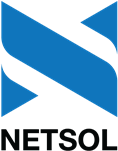U0212 Portfolio
User Defined Fields/Tables
- User Defined Application Fields
- User Defined Application Table
- Other User Defined Fields
- Other User Defined Tables
NOTE: For default portfolio UDT/UDF tables to be cloned, the user must go through each of the UDT/UDF screens.
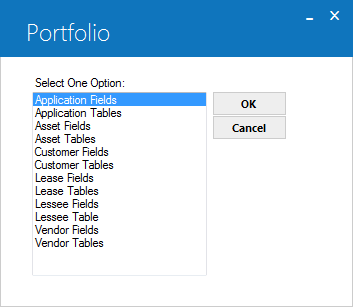
This screen is used to select the field/table areas to be set up.
Option Descriptions
- APPLICATION
FIELDS
Adds or changes user defined fields for lease applications. Appears only if Application Tracking module is purchased.
- APPLICATION
TABLE
Adds or changes user defined tables for lease applications. Appears only if Application Tracking module is purchased.
- ASSET
FIELDS
Adds or changes user defined fields for assets.
- ASSET
TABLES
Adds or changes user defined tables for assets.
- CUSTOMER
FIELDS
Adds or changes user defined fields for customers.
- CUSTOMER
TABLE
Adds or changes user defined tables for customers.
- LEASE
FIELDS
Adds or changes user defined fields for leases.
- LEASE
TABLE
Adds or changes user defined tables for leases.
- LESSEE
FIELDS
Adds or changes user defined fields for lessees.
- LESSEE
TABLE
Adds or changes user defined tables for lessees.
- VENDOR
FIELDS
Adds or changes user defined fields for vendors.
- VENDOR
TABLE
Adds or changes user defined tables for vendors.
User Defined Application Fields
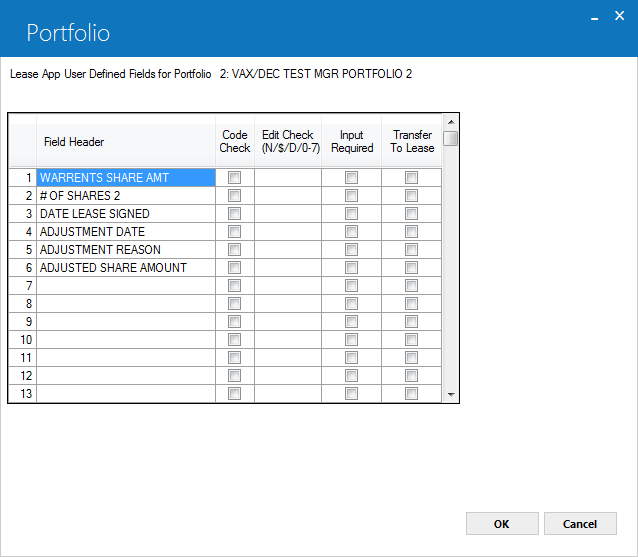
This screen is used to establish or change parameters associated with application level user defined fields.
With the Expanded User Defined Fields module, you can configure up to 250 user-defined fields. Fields defined here are accessed in Tab 2, User Defined Fields of the Application tabs [U0801]. They are reported on in the User Defined Fields/Table section of the Application Inquiry report [R0502] and, if the fields are set to transfer to lease, in the Lease Inquiry report [R0905].
Once fields are defined and data is entered into user defined field records connected to specific applications, redefining one or more fields through this update may make existing data for these fields incorrect.
Field Descriptions
- FIELD
HEADER (scrolled area)
Enter the field name or label that appears on the screen when entering data for applications. With the Expanded User Defined Fields module, you can configure up to 250 user-defined fields. If no fields are defined, the User-Defined Fields screen does not appear when entering applications.
If a FIELD HEADER is entered, CODE CHECK and INPUT REQUIRED must also be entered.
- CODE CHECK
(Y/N) (scrolled area)
Enter Y if a code check is to be done on values entered in this field during application entry. A code check means that the value entered into this field is compared to a list of valid codes established for this field using the Custom Code update [U0722]. In this way, the values entered into this field may be limited to a number of predetermined four-character codes. Refer to the Custom Code update [U0722] for more information on establishing custom codes.
- EDIT CHECK (N/$/D/0-7)(scrolled area)
Enter N for numeric, $ for dollar amount, D for date, 0-7 for number of decimal places, or leave blank for alphanumeric edit check. - Numeric edit check means that only the digits zero through nine (0, 1, 2, ... 9), and the plus sign (+) and minus sign (-) are accepted as input for this field.
- When you enter a user-defined dollar amount (field or table column type '$') or sees it in a report, the amount will appear with a leading dollar sign, have a fixed point at two decimal places, and include thousands separators as needed.
LeasePak will continue to store the dollar amount value as a "cents" value, without the leading dollar sign, decimal places, or thousands separators.
Examples:Input/Display Stored Value $0.12 12 $123.45 12345 $12,345.67 1234567 - When you enter a user-defined date (field or table column type 'D') or sees it in a report, the date will appear either as mm/dd/yy or dd/mm/yy, depending on the user's setup for date preference. Refer to Security update [U0706] for more information on date preference settings.
LeasePak will continue to store the date value as yymmdd, always in that order and without separating slashes. - When you enter one of the new user-defined fixed-decimal values (field or
table column type 0-7) or sees it in a report, the value will appear with a decimal
and include thousands separators as needed.
The position of the decimal will depend on which 0-7 edit check was used to set
up the field or table column in User Defined Fields/Tables [U0212].
LeasePak will store the value with the decimal, but without any thousands separators.
Examples:
Edit Check Input/Display Stored Value 0 123 123 0 1,234 1234 1 123.4 123.4 1 1,234.5 1234.5 2 123.45 123.45 2 1,234.56 1234.56 3 123.456 123.456 3 1,234.567 1234.567 - When you enter an option other than N, $, D, 0-7, or ' ' (blank for alphanumeric), LeasePak shows the following updated error message to include the new option.

- INPUT REQUIRED (Y/N) (scrolled
area)
Enter 'Y' if this field is required, meaning that the user must enter a value in this field before proceeding. If this field is formated numeric (N, $, 0-7), the user must enter a value other than 0.
- TRANSFER
TO LEASE (Y/N) (scrolled area)
Enter Y if this field is to also appear after the lease is booked. If any of the fields are set to be transferred to lease, they must also be set up, in the same order, as user defined lease fields. For example, if Field 3 is to be transferred, the same field must be set up in the Field 3 position for user defined lease fields.
This switch only appears for application user defined fields and table.
User Defined Application Table
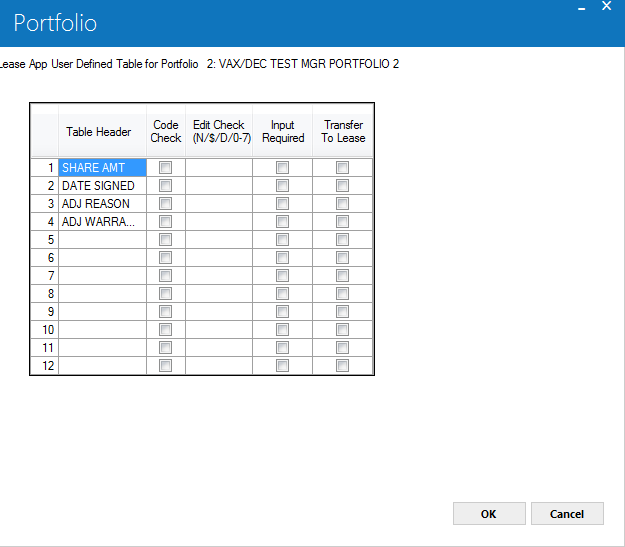
This screen is used to establish or change a application level user defined table.
A maximum of 12 columns may be established. Columns defined here are accessed in Tab 2, User Defined Table of the Application tabs [U0801]. They are reported on in the User Defined Fields/Table section of the Application Inquiry report [R0502] and, if the fields are set to transfer to lease, in the Lease Inquiry report [R0905]. In this update each column may have a maximum of 51 associated elements. Thus, the maximum size of the table is 12 columns by 51 rows.
Once table columns are defined and data is entered into user defined table records connected to specific applications, redefining one or more columns through this update may make existing data for these columns incorrect.
Field Descriptions
- TABLE
HEADER (scrolled area)
Enter or change the names or labels that appear above each table column on the screen when entering user defined data for applications. Any number of columns may be defined, up to a maximum of 12. If no columns are defined, the Application User-Defined Table screen does not appear when entering applications. If 6 or fewer columns are defined, the User-Defined Table screen displays a table with 16 visible lines of scrolled area. If 7 or more columns are defined, the screen is split horizontally so that all column headers may appear on one screen. If this is the case, then the split screen is divided into 2 scrolled areas of 7 lines each. There are 51 elements or rows available in each column. A column element may contain a maximum of 12 characters. Thus, each TABLE HEADER may contain a maximum of 12 characters.
If a TABLE HEADER is entered, CODE CHECK and INPUT REQUIRED must also be entered.
- CODE CHECK (Y/N) (scrolled area)
Enter Y if a code check is to be done on the values entered in this column during application entry. A code check means that the value entered into each element of this column is compared to a list of valid codes established for this column using the Custom Code update [U0722]. In this way, values entered in this column may be limited to predetermined 4-character codes. Refer to the Custom Code update [U0722] for more information on establishing custom codes.
- EDIT CHECK (N/$/D/0-7) (scrolled
area)
Enter N for numeric, $ for dollar amount, D for date, 0-7 for number of decimal places, or leave blank for alphanumeric edit check.
See EDIT CHECK (N/$/D/0-7) for field descriptions.
- INPUT
REQUIRED (Y/N) (scrolled area)
Enter Y if a value must be entered in this column during application entry. If this parameter is Y, INPUT REQUIRED applies only if a value is entered in another column element on the same horizontal line (row) of the table. This is to avoid having to enter a value in every element of a column, even if nothing is entered in the rest of the row.
- TRANSFER
TO LEASE (Y/N) (scrolled area)
Enter Y if this table column is to also appear after the lease is booked. If any of the columns are set to be transferred to lease, they must also be set up, in the same order, as a user defined lease table. For example, if Column 3 is to be transferred, the same column must be set up in the Column 3 position for the user defined lease table.
This switch only appears for application user defined fields and table.
Other User Defined Fields
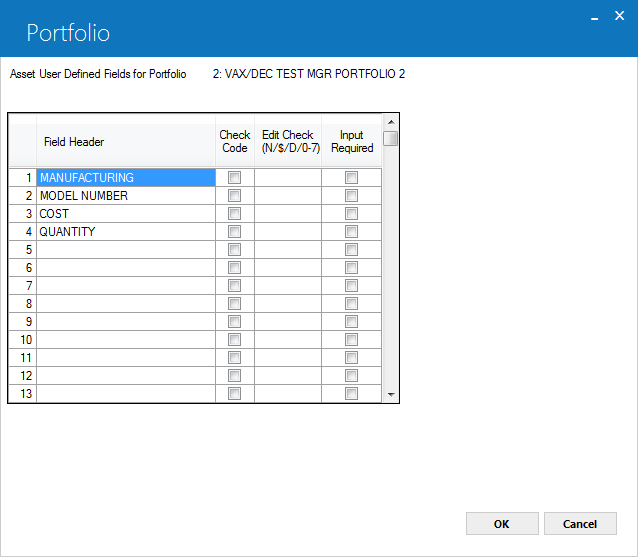
This screen is used to establish or change customized fields for areas other than application.
With the Expanded User Defined Fields module, you can configure up to 250 user-defined fields. Fields defined here are accessed through the following:
- Asset - Application Asset entry [U0801], New Lease/Add Asset or Quick Add Asset [U0101], or Asset update [U0210]
- Customer - Customer update [U0205]
- Lease - transferred from Application, New Lease/Book Lease or Quick Book Lease [U0101], or Master Financial [U0202]
- Lessee - Lessee update [U0203]
- Vendor
- Vendor update [U0201]
Once fields are defined and data is entered into user defined field records, redefining one or more fields through this update may make existing data for these fields incorrect.
Field Descriptions
- FIELD
HEADER (scrolled area)
Enter or change the name or label that appears next to the field on the screen when entering data. With the Expanded User Defined Fields module, you can configure up to 250 user-defined fields. If no fields are defined, the User-Defined Fields screen does not appear in the respective update. Each field name may contain a maximum of 25 characters.
If a FIELD HEADER is entered, CODE CHECK and INPUT REQUIRED must also be entered.
- CODE
CHECK (Y/N) (scrolled area)
Enter Y if a code check is to be done on the values entered in this column. A code check means that the value entered into this field is compared to a list of valid codes established for this field using the Custom Code update [U0722]. In this way, the values entered into this field may be limited to predetermined 4-character codes. Refer to the Custom Code update [U0722]for more information on establishing custom codes.
- EDIT
CHECK (N/$/D/0-7) (scrolled area)
Enter N for numeric, $ for dollar amount, D for date, 0-7 for number of decimal places, or leave blank for alphanumeric edit check..
See EDIT CHECK (N/$/D/0-7) for field descriptions.
- INPUT REQUIRED (Y/N) (scrolled
area)
Enter Y if a value must be entered in this field to process the respective update.
Other User Defined Tables
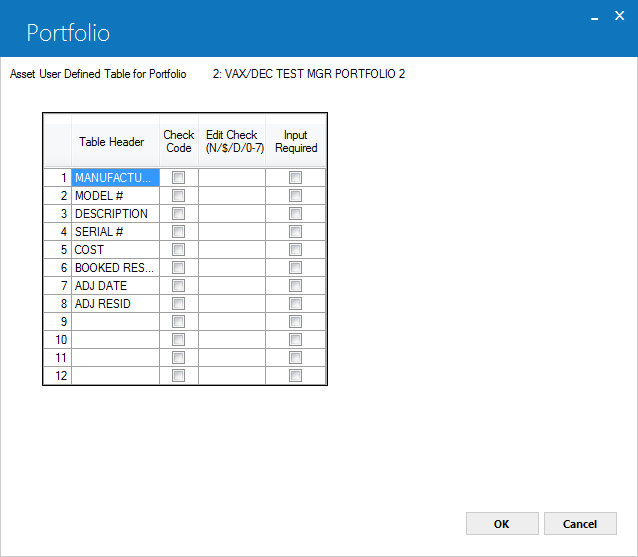
This screen is used to establish or change all areas of user defined tables except application.
A maximum of 12 columns may be established. In this update each column may have a maximum of 51 associated elements. Thus, the maximum size of the table is 12 columns by 51 rows. The fields are used in the following updates:
- Asset - Application Asset entry [U0801], New Lease/Add Asset or Quick Add Asset [U0101], or Asset update [U0210]
- Customer - Customer update [U0205]
- Lease - transferred from Application, New Lease/Book Lease or Quick Book Lease [U0101], or Master Financial [U0202]
- Lessee - Lessee update [U0203]
- Vendor
- Vendor update [U0201]
Once table columns are defined and data is entered into user defined table records, redefining one or more columns through this update may make existing data for these columns incorrect.
Field Descriptions
- TABLE
HEADER (scrolled area)
Enter or change the names or labels that appear above each table column on the screen when entering user defined data. Any number of columns may be defined, up to a maximum of 12. If no columns are defined, the User-Defined Table screen does not appear when using the respective updates. If 6 or fewer columns are defined, the User-Defined Table screen displays a table with 16 visible lines of scrolled area. If 7 or more columns are defined, the screen is split horizontally so that all column headers may appear on one screen. If this is the case, then the split screen is divided into 2 scrolled areas of 7 lines each. There are 51 elements or rows available in each column. A column element may contain a maximum of 12 characters. Thus, each TABLE HEADER may contain a maximum of 12 characters.
If a TABLE HEADER is entered, CODE CHECK and INPUT REQUIRED must also be entered.
- CODE CHECK
(Y/N) (scrolled area)
Enter Y if a code check is to be done on the values entered in this column. A code check means that the value entered into each element of this column is compared to a list of valid codes established for this column using the Custom Code update [U0722]. In this way, values entered in this column may be limited to predetermined 4-character codes. Refer to the Custom Code update [U0722] for more information on establishing custom codes.
- EDIT
CHECK (N/$/D/0-7) (scrolled area)
Enter N for numeric, $ for dollar amount, D for date, 0-7 for number of decimal places, or leave blank for alphanumeric edit check..
See EDIT CHECK (N/$/D/0-7) for field descriptions.
- INPUT
REQUIRED (Y/N) (scrolled area)
Enter Y if a value must be entered in this column to process the respective update. If this parameter is Y, INPUT REQUIRED applies only if a value is entered in another column element on the same horizontal line (row) of the table. This is to avoid having to enter a value in every element of a column, even if nothing is entered in the rest of the row.


